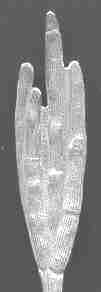This spoon brought a portion of history to my attention.
I was unaware of this part of the American/Mexican relationship.

This silver plated spoon says "Mexican Border 1916" on the stem and the bowl has a picture of tents
The top picture shows a soldier standing guard and below is an eagle shield with the words "E. Pluribus unum"
Below the shield are crossed American flags with the words "National Union"
Manufactured by Wallingford Co.

enlarged view of the bowl
The border war was a series of incidents lasting from 1910 to 1919. The major activity was in 1916.
After the Mexican Revolution of 1910, the US Army was stationed along the border.
In January of 1916 there was the San Isabel Massacre where the Villistas raided a train and killed 18 Americans.
In 1916, Pancho Villa attacked the town of Columbus, N.M.
Gen. Pershing launched an attack to capture Villa.
The campaign was partly successful in that many of the Villistas were killed, but Pancho Villa escaped.
A couple of other American border towns were also attacked.
In April, President Wilson ordered the National Guard to re-inforce the border army.
In June, the 10th Cavalry 'Buffalo Soldiers' suffered a defeat at the battle of Carrizal.
There were a series of other raids and skirmishes starting in June which lasted for several years.
Gen Patton (8th Cavalry) conducted America's first assault using armored vehicles (tanks) at San Miguelito, Mex.
On March 19, 1916,
The First Aero Squadron flew its first wartime support mission to support the troops .

Silver plated spoon showing a Mexican soldier/rebel.
I have no idea if this spoon is concurrent with the war or was made sometime later
I am not sure if the style of armaments is correct.
No manufacturer marking


This sterling spoon features a nice cactus handle and an engraved bowl depicting a Mexican border Monument
This monument was probably erected before 1900

another view of a border monument from Tijuana
52 border boundary monuments were erected from 1849 to 1957.
Most were simple stone mounds without mortar, but seven were substantial monuments of marble or cast iron.
Return to Spoon Planet Exhibits index